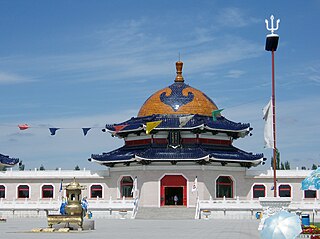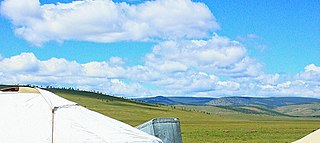
Buyant-Ukhaa International Airport, formerly called Chinggis Khaan International Airport from 2005 to 2020, is a semi-operational international airport serving Ulaanbaatar, Mongolia, situated 18 km (11 mi) southwest of the capital. Largely replaced by a new airport, it currently functions as a backup airport, with a view to be used for flight training as well as for special, charter, and government flights.

The Mausoleum of Genghis Khan is a temple dedicated to Genghis Khan, where he is worshipped as ancestor, dynastic founder, and deity. The temple is better called the Lord's Enclosure, the traditional name among the Mongols, as it has never truly contained the Khan's body. It is the main centre of the worship of Genghis Khan, a growing practice in the Mongolian shamanism of both Inner Mongolia, where the temple is located, and Mongolia.

Jochi Khan was a Mongol army commander who was the eldest son of Temüjin, and presumably one of the four sons by his principal wife Börte, though issues concerning his paternity followed him throughout his life. An accomplished military leader, he participated in his father's conquest of Central Asia, along with his brothers and uncles.

Khentii is one of the 21 aimags (provinces) of Mongolia, located in the east of the country. Its capital is Chinggis City. The aimag is named after the Khentii Mountains. It is best known as the birthplace and likely final resting place of Temüjin, otherwise known as Genghis Khan.
Yassa was the oral law code of the Mongols declared in public in Bukhara by Genghis Khan de facto law of the Mongol Empire even though the "law" was kept secret and never made public. The Yassa seems to have its origin as wartime decrees, which were later codified and expanded to include cultural and lifestyle conventions. By keeping the Yassa secret, the decrees could be modified and used selectively. It is believed that the Yassa was supervised by Genghis Khan himself and his stepbrother Shikhikhutag, then the high judge of the Mongol Empire. Genghis Khan appointed his second son, Chagatai, to oversee the laws' execution.
Genghis Khan was the founder and Great Khan (Emperor) of the Mongol Empire.

Yelü Chucai, courtesy name Jinqing, was a Khitan statesman from the imperial clan of the Liao dynasty, who became a vigorous adviser and administrator of the early Mongol Empire in the Confucian tradition. He was the first of Genghis Khan's retainers to formulate policy during the Mongol invasions and conquests, and he also introduced many administrative reforms in North China during the reign of Genghis Khan and his successor Ögedei.

Jack McIver Weatherford is the former DeWitt Wallace Professor of anthropology at Macalester College in Minnesota. He is best known for his 2004 book, Genghis Khan and the Making of the Modern World. In 2006, he was awarded the Order of the Polar Star, and the Order of Chinggis Khan, Mongolia’s two highest national honors.

Sükhbaatar Square is the central square of Mongolia's capital Ulaanbaatar. The square was named for Mongolian's revolutionary hero Damdin Sükhbaatar after his death in 1923. The square's name was changed to Chinggis Square in 2013 in honor of Genghis Khan, considered the founding father of Mongolia, but the original name was restored in 2016. The center of the plaza features an equestrian statue of Damdin Sükhbaatar, while a large colonnade monument dedicated to Genghis Khan, as well as to Ögedei Khan and Kublai Khan, dominates the square's north face directly in front of the Saaral Ordon.

The Kharchin, or Kharachin, is a subgroup of the Mongols residing mainly in North-western Liaoning and Chifeng, Inner Mongolia. There are Khalkha-Kharchin Mongols in Dorno-Gobi Province and in Ulaanbaatar, Mongolia.

Genghis Khan, also known as Chinggis Khan, was the founder and first khagan of the Mongol Empire, which later became the largest contiguous land empire in history. Having spent the majority of his life uniting the Mongol tribes, he launched a series of military campaigns which conquered large parts of China and Central Asia.
Ulaanbaatar Airport may refer to:

The Government Palace, also known as the State Palace, is located on the north side of Sükhbaatar Square in Ulaanbaatar, the capital city of Mongolia. It houses various state organs such as the State Great Khural and offices of its members, as well as the offices of the President and Prime Minister. It is sometimes referred to by Ulaanbaatar residents as the "Saaral Ordon," or "Gray Palace" in the Mongolian language due to the exterior's former color.
The Mongol invasion of Central Asia occurred after the unification of the Mongol and Turkic tribes on the Mongolian plateau in 1206. It was finally complete when Genghis Khan conquered the Khwarazmian Empire in 1221.

Chinggis Khaan International Airport, also referred to as New Ulaanbaatar International Airport, is an international airport located in the Khöshig Valley of Sergelen, Töv, Mongolia, 52 km south of the capital Ulaanbaatar and 20 km southwest of Zuunmod. It started its operations on 4 July 2021 and serves as the primary airport for Ulaanbaatar and its metropolitan area, functioning as a replacement for Buyant-Ukhaa International Airport. Named after Genghis Khan (1162–1227), it is the largest air facility in the country, serving as a hub for all major Mongolian airlines.

Religion in Inner Mongolia is characterised by the diverse traditions of Mongolian-Tibetan Buddhism, Chinese Buddhism, the Chinese traditional religion including the traditional Chinese ancestral religion, Taoism, Confucianism and folk religious sects, and the Mongolian native religion. The region is inhabited by a majority of Han Chinese and a substantial minority of Southern Mongols, so that some religions follow ethnic lines.
Genghis Khan was the founder of the Mongol Empire.
Temujin is the birthname of Genghis Khan, the founder of the Mongol Empire.











